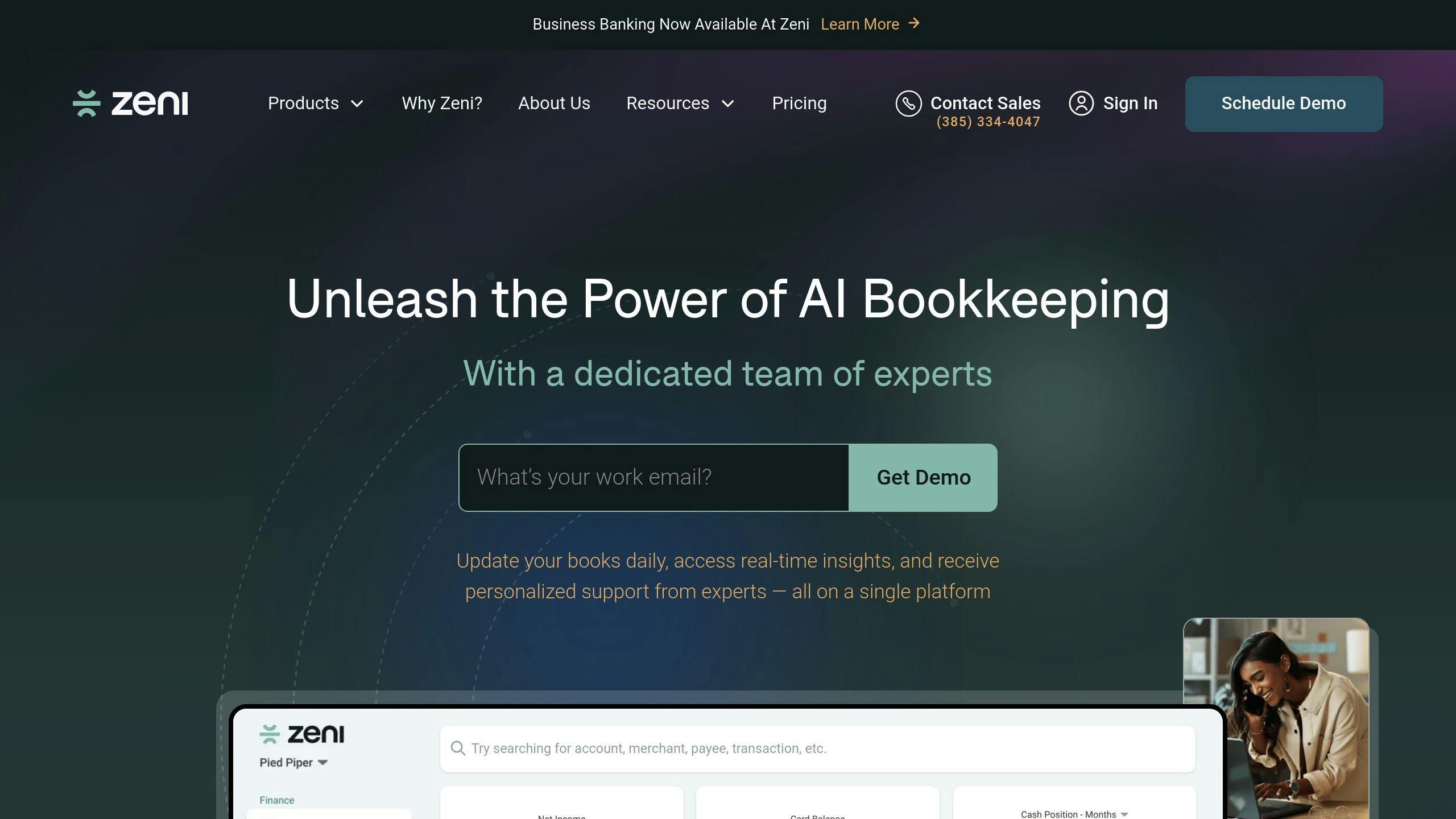AI tools are transforming how startups manage their finances by automating tasks, providing real-time insights, and helping businesses stay prepared for challenges. Here's what you need to know:
- Why It Matters: Poor financial management is a leading cause of startup failures. AI tools help by streamlining operations, improving cash flow, and enabling smarter decisions to support growth.
- Key Tools:
- Lucid Financials: Focuses on financial planning, scenario modeling, and integrations with tools like QuickBooks.
- Zeni: Automates bookkeeping, tax filings, and expense tracking to simplify daily financial tasks.
- Others: Tools like FP Alpha and HighRadius tackle document analysis and payment processing.
- Benefits:
- Automates repetitive tasks, saving time and reducing errors.
- Provides real-time financial data for better decision-making.
- Scales with your business as financial needs grow.
Quick Comparison
| Tool | Core Feature | Best For |
|---|---|---|
| Lucid Financials | Financial planning, integrations | Early-stage startups focusing on growth |
| Zeni | Bookkeeping, compliance | Day-to-day financial management |
| FP Alpha | Document analysis | Advanced financial insights |
Startups can use these tools to manage cash flow, plan for growth, and stay resilient in competitive markets. Choose the tool that aligns with your startup's current needs and future goals.
Related video from YouTube
AI Tools That Help Startups Build Financial Stability
Startups today face intense competition, making reliable financial tools essential. AI-powered platforms are stepping in to simplify operations and support long-term financial health.
Lucid Financials

Lucid Financials offers AI-driven financial planning paired with real-time integrations. It provides instant financial plans, scenario comparisons, and tools designed to assist with scaling and raising capital. The platform integrates with tools like QuickBooks, payroll systems, and banking platforms, creating a centralized financial management system. With pricing options ranging from free basic plans to advanced tiers with unlimited scenarios, Lucid caters to startups at various growth stages.
Zeni

Zeni focuses on automating routine financial tasks like bookkeeping and compliance. Its AI tools help startups monitor spending and keep finances on track, while also handling tax filings to ensure everything stays compliant. This makes it a perfect companion to platforms like Lucid Financials.
Other Useful AI Tools for Financial Management
Startups often encounter unique financial hurdles, and specialized AI tools can address these specific needs:
- FP Alpha: Automates document analysis, offering deep financial insights.
- Pontera: Uses machine learning to optimize asset management.
- HighRadius: Streamlines payment processes, reducing delays and improving cash flow [3].
These tools give startups the ability to handle everything from financial planning to payment processing. By addressing different aspects of financial management, they help create systems that are better equipped to support growth and stability.
Why AI Tools Are Useful for Financial Planning
AI-driven financial tools are changing the way startups manage their finances. These tools simplify complex tasks, offering startups a smarter way to handle their money and make better decisions that directly affect their growth.
Saving Time Through Automation
AI tools like Zeni take care of repetitive tasks like tracking expenses, analyzing burn rates, and generating investor reports. This not only saves time but also reduces mistakes. With these tools, startups can shift their focus to growth strategies while keeping their financial records accurate and up-to-date [1]. Plus, they offer instant insights, giving startups the ability to make quick, informed decisions when it matters most.
Real-Time Data for Better Decisions
AI platforms work hand-in-hand with existing financial systems, giving startups a clear, real-time view of their financial health. This includes tracking cash flow, analyzing trends, benchmarking against industry standards, and spotting risks early on. By identifying potential issues sooner, startups can plan ahead and stay prepared for uncertainties [1][2].
In fast-changing markets, having access to real-time data can be a game-changer. Quick, informed decisions can make the difference between thriving and struggling. As startups grow, their financial systems need to keep up with increasing demands, and AI tools are built to handle that complexity.
Scaling Financial Operations as Startups Grow
Growth brings more complicated financial needs, but AI tools are designed to adapt. They provide solutions that scale with the business, helping startups avoid bottlenecks and stay resilient. Here’s how these tools support growing companies:
- Integration Capabilities: They connect seamlessly with existing systems, creating a unified financial ecosystem.
- Flexible Planning: Startups can model and compare different financial scenarios, helping them choose the best path forward.
- Resource Optimization: AI tools allow startups to manage their finances effectively without the need for additional hires [4].
FP Alpha is a great example of this adaptability. It uses AI to automate document analysis and provide actionable insights, enabling financial teams to expand their planning services as the business grows.
sbb-itb-17e8ec9
How to Pick the Right AI Tool for Your Startup
Choosing the right AI financial tool can make a big difference in how well your startup handles its finances. The key is to pick a tool that fits your current needs while being able to grow with your business.
What to Look for in an AI Tool
Start by focusing on tools that can easily work with your existing systems. Strong security and compliance are a must to safeguard sensitive data and meet regulatory requirements as your startup scales. Look for features that can grow alongside your business, ensuring the tool remains useful as your needs evolve.
Once you've outlined the features you need, compare different tools to see which aligns best with your financial goals.
Comparing AI Tools for Startups
| Feature | Lucid Financials | Zeni | Impact on Financial Management |
|---|---|---|---|
| Core Functionality | Financial planning, scenario modeling, industry benchmarks | Automated bookkeeping, tax filing, financial analysis | Shapes the depth of financial insights |
| Integration Options | QuickBooks, payroll systems, banks | Multiple accounting platforms, banking systems | Influences data accuracy and workflow efficiency |
| Real-time Capabilities | Instant financial plans, live data updates | Real-time expense tracking, cash flow monitoring | Supports faster decision-making |
Lucid Financials might be a better choice for early-stage startups focused on financial planning and fundraising, thanks to its scenario modeling and benchmarking tools. On the other hand, Zeni could be a better fit for startups that need help managing day-to-day tasks like bookkeeping and tax filing.
AI's Role in Startup Finances
AI tools are changing the way startups handle their finances. By automating tasks, providing real-time insights, and offering scalable solutions, platforms like Lucid Financials and Zeni help startups make smarter, data-driven decisions. These tools not only simplify financial management but also help businesses stay prepared for challenges and focus on growth.
Why Startups Should Consider AI Tools
AI tools can make tackling financial hurdles much simpler. The key is to choose solutions that fit your startup's specific needs. Start by identifying your biggest financial pain points and see how AI can help address them. Adopting AI tools can streamline operations and set the stage for steady growth, even in a competitive market.
FAQs
How is AI used in financial risk management?
AI helps manage financial risks by spotting patterns, keeping an eye on transactions, and flagging unusual activity such as suspicious transfers. These features enable startups to address risks early and maintain financial health.
What role does AI play in financial planning for startups?
AI reshapes financial planning by offering instant scenario modeling and automated insights. These tools connect with existing systems, allowing startups to make quick, informed decisions based on up-to-the-minute market data. This makes it easier to test strategies and adjust to changes.
How can AI tools assist startups in investor meetings?
AI platforms simplify report creation by focusing on critical metrics like burn rate, revenue growth, and cash flow. This automation frees up time for startups to refine their strategy while presenting clear, data-backed insights to investors [1].
What should startups consider when choosing an AI financial tool?
Startups should look for tools that offer real-time integration, scalability, detailed reporting, and strong security features to ensure smooth financial operations and support growth.
How can AI tools help startups respond to market changes?
AI tools allow startups to adjust strategies quickly using real-time risk assessments. By combining predictive analytics with automated tracking, these tools offer the insights needed to make fast, informed decisions in a changing market.


